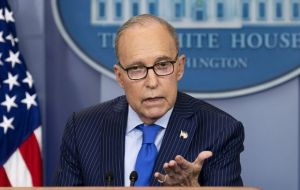MercoPress. South Atlantic News Agency
Sino/US clash eases: Beijing supports Yuan and Washington pledges to continue trade talks
 The rebound came as the People's Bank of China took steps to stabilize the Yuan with a firmer-than-expected fixing and a bond sale
The rebound came as the People's Bank of China took steps to stabilize the Yuan with a firmer-than-expected fixing and a bond sale  Larry Kudlow, director of the White House National Economic Council, said the Trump administration wants to continue trade talks with China
Larry Kudlow, director of the White House National Economic Council, said the Trump administration wants to continue trade talks with China Asian shares steadied slightly on Wednesday as investors caught their breath from a searing week-long selloff, with steps taken by Chinese authorities to contain a sliding Yuan helping calm fears of a full-blown Sino-U.S. trade and currency war.
MSCI's broadest index of Asia-Pacific shares outside Japan was up 0.05% in early trade after tumbling 8.26% in the previous eight sessions. Japan's Nikkei bucked the trend to slip 0.26%.
On Wall Street on Tuesday, the S&P 500 gained 1.30per cent and MSCI's broad gauge of stocks across the world rose 0.50per cent, its first gain in seven sessions.
The rebound came as the People's Bank of China took steps on Tuesday to stabilize the Yuan with a firmer-than-expected fixing and a bond sale to signal that the authorities wished to stem the rout.
Comments from Larry Kudlow, director of the White House National Economic Council, also soothed sentiment. Kudlow said on Tuesday the Trump administration wants to continue trade talks with China and is still planning to host a Chinese delegation for talks in September.
The Yuan had fallen sharply on Monday, going past the symbolic 7-per-dollar level, and prompting Washington to label Beijing a currency manipulator in a major escalation of the year-long trade dispute between the world's two largest economies.
In early Asian trade on Wednesday, the offshore Yuan was flat at 7.0533 Yuan per dollar , off Tuesday's low of 7.1400, its weakest level since international trading in the Chinese currency began in 2010.
Many investors believe Trump cannot afford prolonged instability in financial markets since his reputation was staked so closely on economic growth and the success of the U.S. stock market.
Overall, however, market sentiment remained fragile and with no clear end in the trade standoff in sight, some investors expect a rocky session ahead.
Goldman Sachs said it no longer expects a trade deal to be struck before the November 2020 U.S. presidential election, while Morgan Stanley warned that more tit-for-tat tariffs could tip the world economy into recession by the middle of next year.
That rather grim backdrop supported safe-haven assets, with gold hitting a six-year high of US$1,477 per ounce in early Wednesday trade. It last stood at US$1.474.7.
U.S. bonds have also retained much of their gains made in the past week. The 10-year Treasuries notes yielded 1.695 percent , compared to above 2 percent just a week ago, as investors bet on another rate cut by the Federal Reserve in September.
In the currency market, the dollar was traded at 106.33 yen, down 0.13per cent from late U.S. levels, but off Tuesday's seven-month low of 105.52.
The euro stood flat at US$1.1203 . The Australian dollar fetched US$0.67605, just a stone throw from its seven-month low of US$0.6748 touched on Monday.
Oil prices also weakened, with global benchmark Brent crude slipping to seven-month lows, as trade tensions between the U.S. and China intensified worries about weakening world demand.
Brent crude futures fell 0.36% to US$58.73 a barrel, near its low on Tuesday of US$58.55, a trough last seen in early January.




Top Comments
Disclaimer & comment rulesCommenting for this story is now closed.
If you have a Facebook account, become a fan and comment on our Facebook Page!